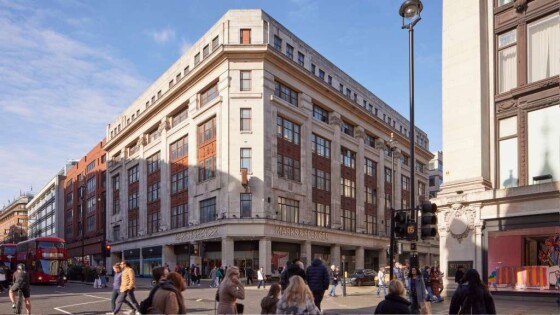Angela Rayner, secretary of state for housing, communities and local government, has granted approval for the replacement of the art deco M&S store near Marble Arch with a new building.
It brings to a close a long planning battle but the debate over retrofit versus rebuild continues.
Marks & Spencer submitted a planning application to demolish and rebuild the 1930s store at 456-472 Oxford Street, also known as Orchard House, back in March 2021. In June 2022 it was called in by the then secretary of state Michael Gove, who turned down the application in July 2023. That decision was challenged by way of an application to the High Court and was subsequently quashed by the court in March 2024. It was therefore left to the current secretary of state, Rayner, to sign off the application, which she has now done.
In short, Rayner agreed with the original inspector that there would be no direct effect on designated heritage assets and came down on the side of the argument that says rebuilding, in this case, is better than retrofitting.
M&S claims that it tested 16 different plans to retrofit the store, all of which proved to be untenable due to the complexity of the site, which is actually made up of three different buildings – of different heights, sizes and age. Even a heavy refurbishment was highly likely to involve more embodied carbon and leave its structural flaws unremedied, limiting options to improve energy use, the retail says.
The new building – two basement levels, ground plus nine storeys – will use less than a quarter of the energy of today’s structure, with 95% of the existing building materials recovered, recycled or reused and the water consumption halved, according to M&S.
The new building has a design life of 120 years and carbon payback within 11 years of construction, it says.
M&S chief executive Stuart Machin, who had previously called Gove’s intervention “utterly pathetic”, naturally welcomed Rayner’s decision. He said: “I am delighted that, after three unnecessary years of delays, obfuscation and political posturing at its worst, under the previous government, our plans for Marble Arch – the only retail-led regeneration proposal on Oxford Street – have finally been approved. We can now get on with the job of helping to rejuvenate the UK’s premier shopping street through a flagship M&S store and office space, which will support 2,000 jobs and act as a global standard-bearer for sustainability.
“We share the government’s ambition to breathe life back into our cities and towns and are pleased to see they are serious about getting Britain building and growing. We will now move as fast as we can.”
Speaking for developers and landlords more generally, London Property Alliance chief executive Charles Begley said: “I hope with this decision we can finally end the uncertainty which has acted as a drag on investment, damaging growth and the jobs that go with it. It is disappointing it has taken so long, which sends a negative message to those willing to invest in London and beyond. The government now needs to ensure that planning reform supports sustainable redevelopment, and whilst giving stronger guidance to local councils, needs to set itself strict timelines to deal with contentious decisions once it intervenes to prevent a repeat of this long running saga.

“The fact that the property industry had been waiting the outcome of this case for clarity is clearly a failure of national policy. The application itself had unfortunately become a lightning rod for the ‘retrofit v redevelopment’ debate, but we need to recognise that a more nuanced approach is needed and policy must allow and support a range of interventions on a case-by-case basis.”
![The current store that will now be demolished [Photo: Matthew Andrews] The current store that will now be demolished [Photo: Matthew Andrews]](https://www.theconstructionindex.co.uk/img-cache/562efc77865703312730d429e37f5039/320x213.33333333333_1733470882_old-orchard-house-mands-matthew-andrews.jpeg)

However, conservation campaign group Save Britain’s Heritage (Save) said it was time to stop incentivising demolition and fix holes in the national planning system.
Save argues that the carbon emitted by the construction of buildings should be taken into account as well as the carbon emitted when they are in use. Current policy focuses on so-called operational carbon rather than embodied carbon.
Henrietta Billings, director of Save Britain’s Heritage, said: “Rethinking our wasteful knock-it-down-and-start-again approach to development and re-using and updating existing buildings like M&S Oxford Street is a win-win. It’s good for the planet and it’s good for our towns and communities.
“No-one is suggesting these buildings are pickled in aspic – it’s a pro-growth approach. Restored and transformed buildings have turbo-charged regeneration all over the country, everywhere from Tate Modern in London to former department stores in Bournemouth, Bristol, Edinburgh and Gloucester.”


Simon Sturgis, founder of Targeting Zero, government adviser on sustainability and Save’s expert witness at the public inquiry, said: “The secretary of state’s decision on M&S continues the uncertainty with respect to prioritising retrofit over demolition. As we approach net zero in 2050 it is inevitable that retrofit will become increasingly crucial in helping achieve government carbon and waste reduction targets. The government now needs to ensure that net zero legislation is embedded in planning policy to make it fit for dealing with the climate crisis of the 21st century.”
Even some developers side with Gove over Rayner in the debate about reuse or rebuild.
Tyler Goodwin, founder and chief executive of Seaforth Land, which specialises in retrofitting London properties, said: “Save’s M&S campaign has been a defining case for the property industry at a critical moment in history. As a developer, I see the clear commercial benefits of reusing historic buildings. Tenants are relying on their office space to win the war for talent and to earn their commute back to the office, and we are seeing a material shift in demand for best-in-class buildings that can offer a unique, authentic, and sustainable office experience that a generic glass box just can’t provide. If M&S don’t want Orchard House, I’m confident there is an exciting adaptive reuse scheme in its future.”

